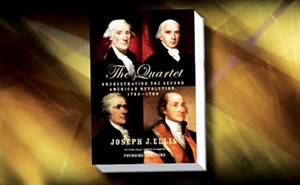Bells in Springfield – church bells, hand bells, even cell phone ringers – rang at 2:15 p.m. on April 9 to mark the 150th anniversary of the end of major Civil War fighting. Except, as I explored in part in “Naming rights and wrongs” (July 9, 2015), the Civil War fighting is not over, it’s only moved to new battlefields. Any honest reckoning would count the dead in places like Ferguson and Charleston among Civil War casualties. The armies today are political, and the neo-Confederate troops are slowly doing to the North what Sherman did to Georgia. In Congress, the right wing based in the South have mounted a political insurrection intended to wreck the hated national government constructed in 1787 and confirmed in 1865, and hereabouts they are turning Wisconsin, Indiana, Ohio, Missouri and Iowa into Midwestern Mississippis. The subtext of the messages delivered during the Republican Party’s first primary election debates was the promised re-establishment of the white ascendancy that once ruled the South in which white massahs will put women and blacks back in their place, gays back in the closet, the Bible back in the schools and migrants back across the border.
I thought of all this while reading The Quartet, the newest book by the much-praised historian Joseph Ellis about the transformation of 13 newly liberated American colonies into the constituent states in a new nation under our present Constitution. Ellis explains in a preface that the ideas for the book came to him while listening to school kids recite the Gettysburg Address.
It dawned on me that the first clause in the first sentence of Lincoln’s famous speech was historically incorrect. . . . Four score and seven years ago our fathers did not bring forth on this Continent a new Nation. In 1776 thirteen American colonies declared themselves independent states that came together temporarily to win the war, then would go their separate ways.
The government the colonies created in 1781 under the Articles of Confederation was hardly a government at all and was never intended to be. The rebels, remember, had argued that it was the colonial legislatures in which taxing authority naturally lay, not some imagined American version of Parliament. When the Declaration of Independence declared that the former colonies were leaving the British Empire as “Free and Independent States” it meant independent of each other as well as of Britain.
The original Constitution enshrined state independence as a price of adoption, but the Civil War undid those parts of the document that mattered most to the South. (Others of course have since been gradually abrogated by Congress and the courts.) Millions of Americans, most of them in the former South and in those states whose politics is dominated by Southern migrants, mourn that lost independence; there is some basis for the claim by today’s secessionists to being our true patriots, insofar as they hark back to the “real” America that existed before 1788.
A constitution to which members states feel so little bound needed fixing, not enforcing. Lincoln saw the Constitution as a sacred document and the Union as sacrosanct. (Historian Charles Strozier, late of SSU, had some provocative things to say about why in the 1970s.) The founders had to make a terrible compromise with the slavers to get it approved, yet Lincoln was prepared to let slavery stand if it meant saving the Union, as he explained in his famous open letter to Horace Greeley.
The admission of the Southern states to the Union was our national original sin, for which we have been punished ever since. Should Lincoln have negotiated a reordering of the Union by giving the South their independence? It will be argued that letting the South win a second American war for independence meant continued oppression of the slaves. But forced emancipation meant for them a century of economic subjugation and Jim Crow enforced by murderous terrorism. Only permanent occupation by the North would have prevented it. Had the economy of the free South eventually collapsed, as was widely assumed, Southern whites would have simply quit exporting cotton and started exporting black people, with the result that the North would see mass migration of a sort now troubling Europe.
These are just idle speculations on a day when contemplating the politics of Illinois is too depressing. Unlike the case in 1860, the South would not leave the Union now if it could. For one thing, it survives economically on Northern fiscal transfers, much of which comes from states like Illinois. Better yet for the South, it bids fair to re-establish its independence within the Union. So the question is settled – not because Lincoln got it right but because we have no Lincoln who might lead us out of this mess.
Contact James Krohe Jr. at [email protected].
Lincoln’s Union problem
Is the U.S. a nation-state or a nation of states?
[
{
"name": "Air - MedRect Combo - Inline Content 1",
"component": "11490391",
"insertPoint": "3",
"requiredCountToDisplay": "1",
"parentWrapperClass": "fdn-ads-inline-content-block"
},{
"name": "Air - MedRect Combo - Inline Content 2",
"component": "11490392",
"insertPoint": "7",
"requiredCountToDisplay": "5",
"parentWrapperClass": "fdn-ads-inline-content-block"
},{
"name": "Air - MedRect Combo - Inline Content 3",
"component": "11490393",
"insertPoint": "12",
"requiredCountToDisplay": "9",
"parentWrapperClass": "fdn-ads-inline-content-block"
}
]


